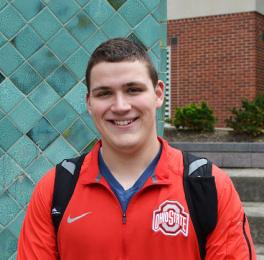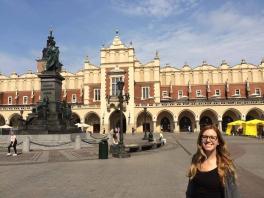Depictions of Clothing in Polish Manuscript
On Oct. 19, John Friedman, professor emeritus of English and Medieval studies from the University of Illinois at Urbana-Champaign, delivered the Polish Studies
Initiative’s autumn 2017 lecture. His talk, “'Dressed to Kill': The Clothing of Christ’s Tormentors in an Illustrated Polish Devotional Manuscript,” focused on an edition of the Dominican Meditations made in Krakow, Poland in 1532. This edition — an illuminated devotional manuscript currently housed in a convent in Krakow — has been little studied and few people have been given access in recent decades.
Illuminated devotional manuscripts were popular in the 16th century as a way for the viewer, typically nuns, monks and other members of the clergy, to empathize with and feel the torment of Jesus as written in the Passion of the Christ from the time of his capture by Pontius Pilate until his execution. Friedman’s talk focused on analyzing the many detailed, realistic miniatures showing the tormentors of Jesus. The tormentors in these miniatures depicted people not wearing Roman-era clothing but clothing that has been elsewhere documented as being popular in the 16th century and contemporaneous to the time of the manuscript’s creation, not the death of Jesus.
Specifically, most of the tormentors in the manuscripts are shown wearing the controversial clothing of German mercenaries. These mercenaries often wore striped
and tattered hose, slashed doublets and ostrich feathers in their hats. Average citizens feared the brutality and lawlessness of these mercenaries, and more prosperous, distinguished classes resented the ostentatious style of the soldiers and its absorption into popular culture. By portraying the tormentors as wearing the 16th century clothing of a despised class of soldiers, the manuscript’s artist enhanced the perception of the brutality of Jesus’ tormentors and tied the images to a group that many people feared at the time. Thus, this version of the Dominican Meditations serves as more than just a text as part of the Catholic Church’s beliefs, but provides cultural insight into the mores and fears of the time.
Education Abroad/Faculty Research Funding
The Polish Studies Initiative is pleased to announce the 2018-19 competition for student scholarships and faculty research grants. Scholarship funds are available to undergraduate and graduate students who intend to study the Polish language overseas or intern in Poland. Grants fund research by faculty on Poland. The deadline for applications is Feb. 1, 2018.

In summer 2017, three undergraduate students received scholarships to support their time in Poland. One of them, Jason Scheele, an aerospace engineering major,
interned at the Institute of Aviation in Warsaw, Poland.
During my time at the Institute of Aviation, I worked on modeling the forces on a helicopter blade during flight using a series of computer programs called Computational Fluid Dynamics. The work I completed this summer granted me an in depth look at the programs used in the aerospace industry today. I also gained firsthand experience solving real-world problems from start to finish, which will benefit me for the rest of my career in aerospace engineering.
Luckily, I lived close to the center of Warsaw, only having to travel 20 minutes on the tram. Nearly every day after work, I traveled downtown to explore Warsaw and experience the Polish culture. I very quickly fell in love with the city of Warsaw because of its amazing public transportation system, cleanliness and, of course, the delicious traditional food that could be found all over the city. I found the Polish people to be extremely friendly and I was quite relieved that nearly everyone spoke English, especially if they were under 30.
—Jason Scheele
In terms of research grants, Nicole Freeman, a history PhD student, used the grant to conduct research in Poland.

Receiving a research grant from the Polish Studies Initiative allowed me to spend six weeks in Poland conducting research for my dissertation, “A Time to
Rebuild: The Education and Rehabilitation of Jewish Children in Postwar Germany and Poland, 1945–1953.” My research explores how the American Jewish Joint Distribution Committee worked alongside the Central Committee of Jews in Poland on behalf of Jewish children to reconstruct Jewish life after the Holocaust. In Warsaw, I studied archival documents that detailed the creation of children’s homes, schools, and summer camps. I also gained access to important Polish-language secondary literature at POLIN Museum of the History of Polish Jews. In addition to conducting research for my dissertation, I took a short weekend trip to Gdańsk where I visited the new Museum of the Second World War. I am so excited to share these experiences with Ohio State students as I prepare to teach my own courses on the Holocaust and the Second World War. Thanks to the Polish Studies Initiative, I was given the opportunity to start research that is absolutely essential to my dissertation and in November, I plan to return to Poland for a long-term research trip.
—Nicole Freeman
With its 2018-19 competition, PSI aims to support the next generation of Polish scholars!
